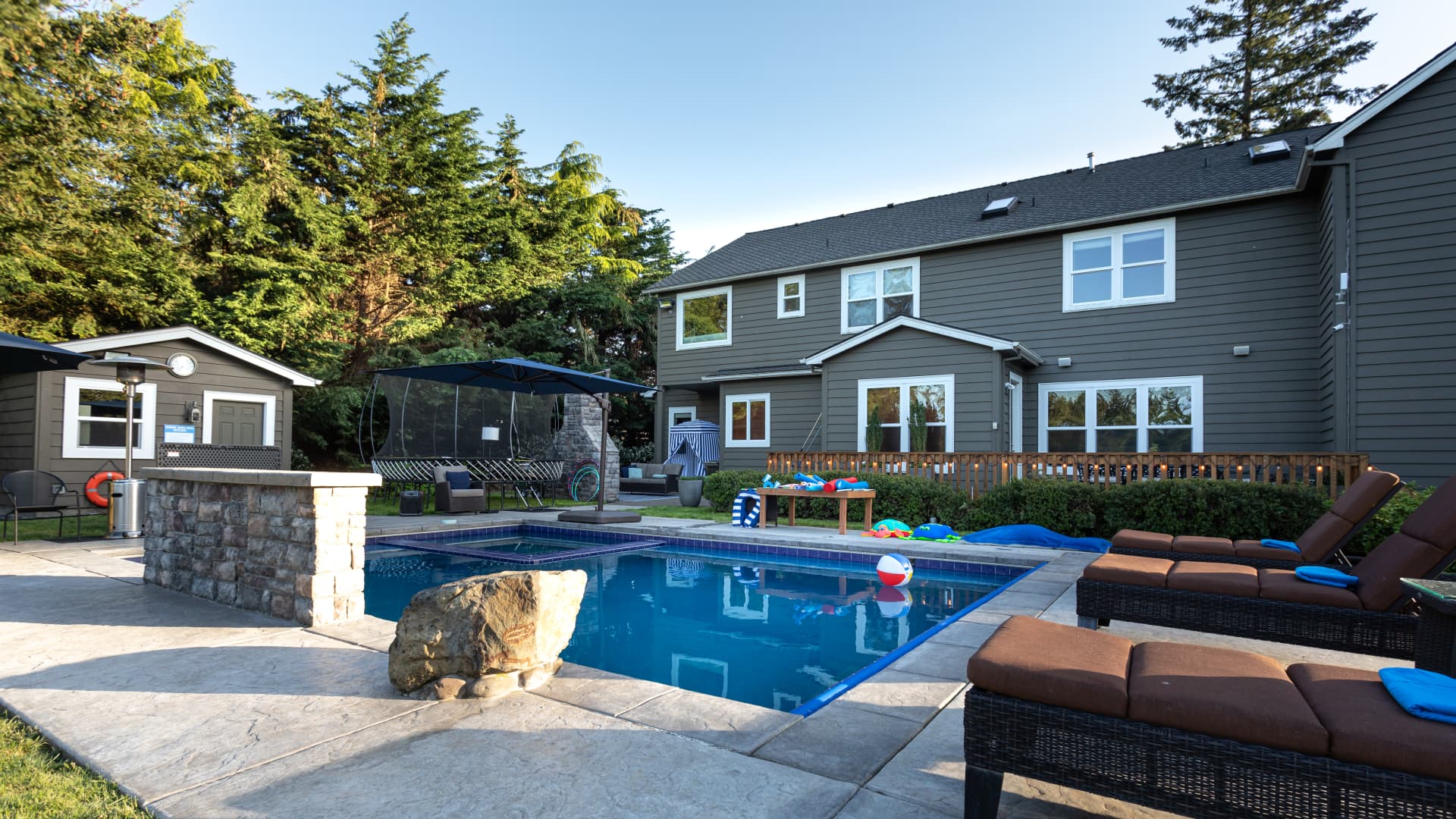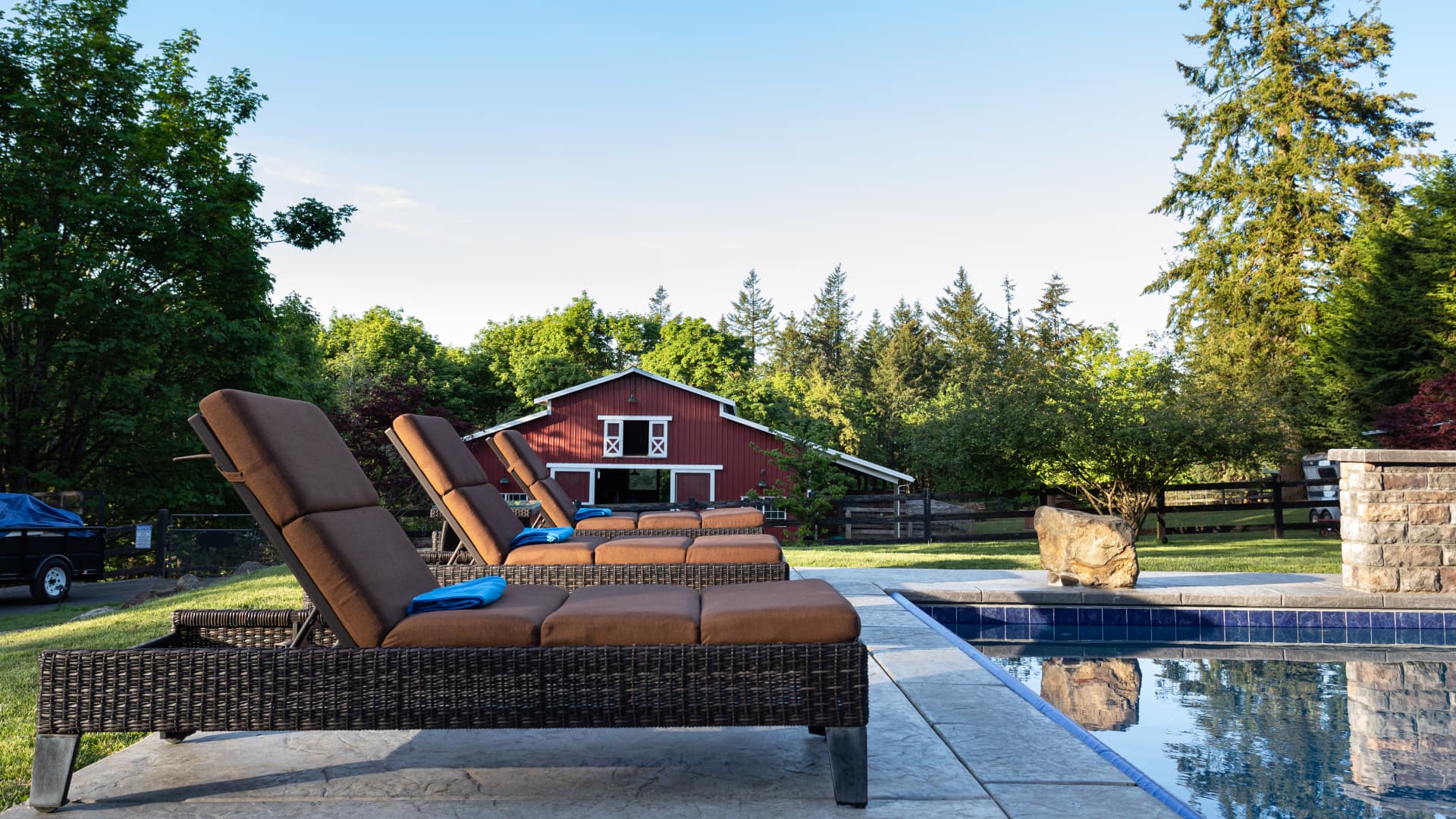
When Jim Battan spent $110,000 building a luxury pool outside his home in West Linn, Oregon in 2012, he knew he was making an investment.
He couldn't have known that 10 years later, he'd earn more than enough to pay it off by renting it out to strangers on the internet. Battan says that since September 2020, his pool has hosted roughly 9,000 swimmers through a platform called Swimply, which dubs itself the Airbnb of swimming pools. The result, according to documents reviewed by CNBC Make It: $177,000 in revenue in less than two years.
"I love to say that [the pool] has paid for itself and more," Battan, 57, tells CNBC Make It. "I built a man cave last year, and also credit that to my Swimply pool."
Battan says the experience isn't for everyone: Hosting a rentable pool isn't as simple as laying out fresh towels between visits. He says he's paid roughly $37,000 on maintenance over the past decade for the 26-foot by 18-foot pool, along with its pool house. From cleaning and testing the water's chemicals to managing all the bookings, Battan estimates he and his wife, Lisa Battan, spend roughly 12 to 14 hours per week on their side hustle.
Get top local stories in Southern California delivered to you every morning. Sign up for NBC LA's News Headlines newsletter.

"I love the income, but I generally caution people from it," Battan says. "Unless you're retired or don't have a day job, it takes a lot of time to learn about pool chemistry and management. It's not good enough to just rely on a once-a-week service to come out look at your stuff. I look at my pool chemicals probably five to 10 times a day."
Plus, Battan's pool is the gold standard: He is Swimply's top earner out of 25,000 pools in the U.S., Canada and Australia. Here's how he manages his pool and keeps his side hustle afloat against growing competition.
Money Report
More than a chlorine caretaker
Battan's pool and its amenities sit on two acres of rural property, meaning they aren't restricted by city or homeowner association regulations. The pool is also right next to the family's barn, where Battan's wife looks after rescued animals like horses, llamas, opossums and pigs.

The location is a draw for families with special-needs children, Battan says. His pool and property are quiet and isolated, which explains the relatively high rental cost: $70 per hour for five people, a rate that rises with additional people and longer durations. Swimply takes a 15% cut from every booking, though Battan says the platform's ease of use is worth it.
During the summers, Battan says he books about 26 visits per week. The rest of the year, he says, he keeps the pool at 90 degrees and offers heated blankets to guests.
"My wife and I are very used to five-star luxury resorts, so we know what excellent customer service looks like," Battan says. "Part of that is ensuring all the needs are anticipated: responding appropriately to queries, greeting [guests] with a smile and making sure that all their needs are satisfied, and then disappearing."
The personal touch seems to pay off: Battan estimates that 65% to 70% of his customers are returning swimmers.
Keeping his side hustle above water
Battan credits Swimply for giving him the unexpected income stream — but says the platform's success may not be sustainable.
When Battan joined in 2020, many local pools were shut down due to Covid restrictions and summer travel was practically nonexistent. These days, he says, demand seems to be decreasing as travel returns and pools reopen.
Plus, as the company signs up more hosts, Battan has more competition. When he joined the platform, there were five pools in the Portland, Oregon, area. Now, he estimates there are 65.
"I'm at about half of my regular bookings this year compared to last year," Battan says. "Swimply is trying to get as many pools as they can, thinking that the demand in terms of swimmers will naturally keep along with that. That hasn't really been the case yet."
According to Swimply co-founder and CEO Bunim Laskin, the company's booking revenue is currently up 100% year-over-year. "As with any marketplace, there are ups and downs for individual hosts," Laskin says. "As the word gets out about Swimply and we add additional hosts to the platform, we are also adding just as many additional users ... Top pools will always be in demand."
Renting out your own personal property always comes with risk, too. Swimply currently offers hosts up to $10,000 to cover the costs of damages sustained during a booking if "the Guest is unwilling or unable to pay for the damages," according to the company's website.
Battan and his wife say they plan to keep renting their pool out for now: They're considering moving to Portugal someday, and hope to pass their Swimply listing to the home's future buyers.
That is, as long as the next owners are willing to put in the effort.
"I think of my pool as an investment and I take it really seriously," he says. "But there are all kinds of hosts out there that I see posting on the Facebook group that say, 'Hey, I put a bunch of chlorine in. Is that good enough?' And I think to myself, 'That's just the beginning of it.'"
Update: This story has been updated to reflect Swimply's property damage protection policy.
Sign up now: Get smarter about your money and career with our weekly newsletter
Don't miss:
This 32-year-old high school dropout turned his video game side hustle into a $105 million startup






